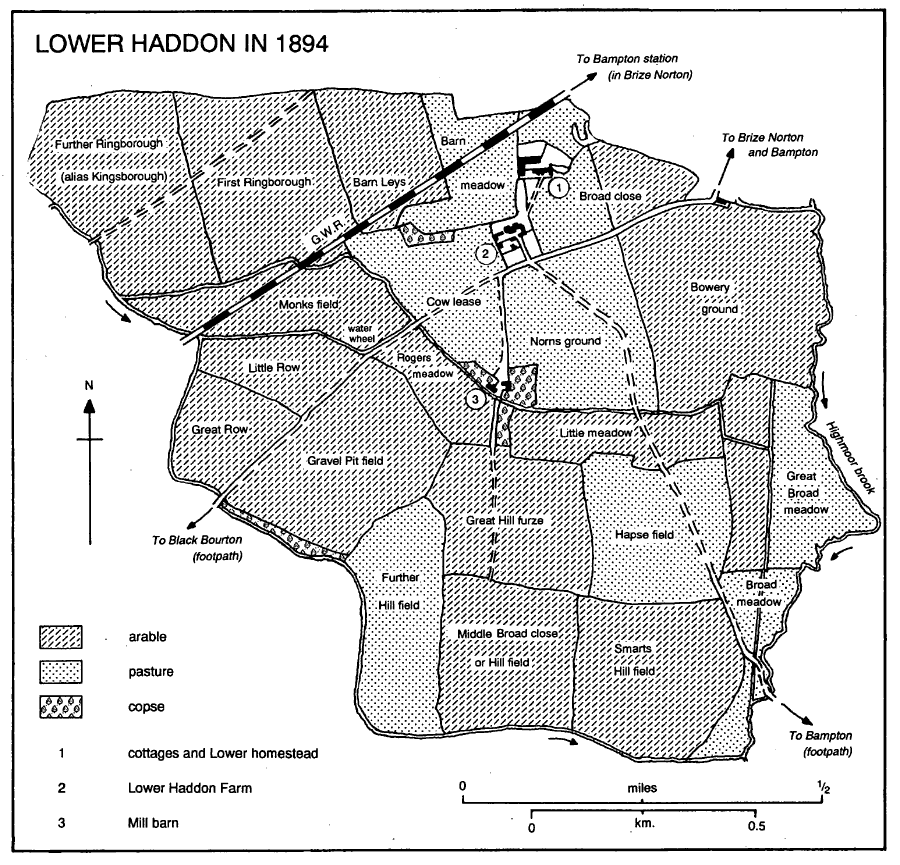A History of the County of Oxford: Volume 13, Bampton Hundred (Part One). Originally published by Victoria County History, London, 1996.
This free content was digitised by double rekeying. All rights reserved.
A P Baggs, Eleanor Chance, Christina Colvin, C J Day, Nesta Selwyn, S C Townley, 'Lower Haddon: Introduction', in A History of the County of Oxford: Volume 13, Bampton Hundred (Part One), ed. Alan Crossley, C R J Currie (London, 1996), British History Online https://prod.british-history.ac.uk/vch/oxon/vol13/pp86-87 [accessed 23 February 2025].
A P Baggs, Eleanor Chance, Christina Colvin, C J Day, Nesta Selwyn, S C Townley, 'Lower Haddon: Introduction', in A History of the County of Oxford: Volume 13, Bampton Hundred (Part One). Edited by Alan Crossley, C R J Currie (London, 1996), British History Online, accessed February 23, 2025, https://prod.british-history.ac.uk/vch/oxon/vol13/pp86-87.
A P Baggs, Eleanor Chance, Christina Colvin, C J Day, Nesta Selwyn, S C Townley. "Lower Haddon: Introduction". A History of the County of Oxford: Volume 13, Bampton Hundred (Part One). Ed. Alan Crossley, C R J Currie (London, 1996), British History Online. Web. 23 February 2025. https://prod.british-history.ac.uk/vch/oxon/vol13/pp86-87.
LOWER HADDON
IN the 14th century Lower or Little Haddon, later c. 457 a., (fn. 1) was taxed with Marsh Haddon in Brize Norton parish as a single township. (fn. 2) From the 13th century and probably from the 11th the two were tenurially distinct, however, the later estate boundary coinciding with that of the parish, and possibly there were two separate foci from an early date. (fn. 3) The name, meaning 'uncultivated hill slope', suggests relatively late colonization; no evidence of early occupation has been noted on either site, and neither was mentioned before the early 13th century. (fn. 4) The prefixes 'Marsh' and 'Little' were recorded in the late 13th century and early 14th, though Little Haddon seems then to have been the more populous. (fn. 5) The name Lower Haddon became established in the later 19th century. (fn. 6)
In 1279 only 5 tenants were recorded at Lower Haddon besides the lord, presumably indicating c. 6 houses; 4 inhabitants were noted at Marsh Haddon, and in 1306 there were 13 taxpayers in the two settlements. (fn. 7) The population was probably little altered in 1331 when rents at Lower Haddon exceeded those recorded in 1279; (fn. 8) only 10 persons over 14 paid poll tax in 1377, however, (fn. 9) which, assuming the return was for both estates, suggests serious depopulation, far greater than in most of Bampton's hamlets. Only three houses were recorded on Little Haddon manor in 1496 (fn. 10) and in the mid 17th century, when they were assessed on 7, 4, and 3 hearths, (fn. 11) and from the later 18th century there were only two, (fn. 12) one of them the former manor house, later Lower Haddon Farm, described below. (fn. 13) The other, c. 150 yd. to the north-east, was that called
the 'Lower House', recorded from the early 17th century when it was temporarily occupied by a relative of the lord and was described as a mansion house. (fn. 14) It was later occupied by tenant farmers and c. 1800 was converted into a cowhouse and agricultural buildings; (fn. 15) labourers' cottages on the site in the later 19th century were demolished in the 20th reportedly following a fire, though agricultural buildings remained in 1992. Other cottages were built on the approach from the Bampton-Brize Norton road before 1894. (fn. 16)

Lower Haddon in 1894
Part of the East Gloucestershire railway was built across Lower Haddon's northern part c. 1873; the line was closed in 1962. (fn. 17) Brize Norton military airbase, which occupies Lower Haddon's western part, was opened in 1937 and extended in the 1950s, its perimeter fence coming within a few hundred yards of the farmhouse. Proposals c. 1957 to extend the main runway across the Bampton-Brize Norton road were rejected. (fn. 18)
